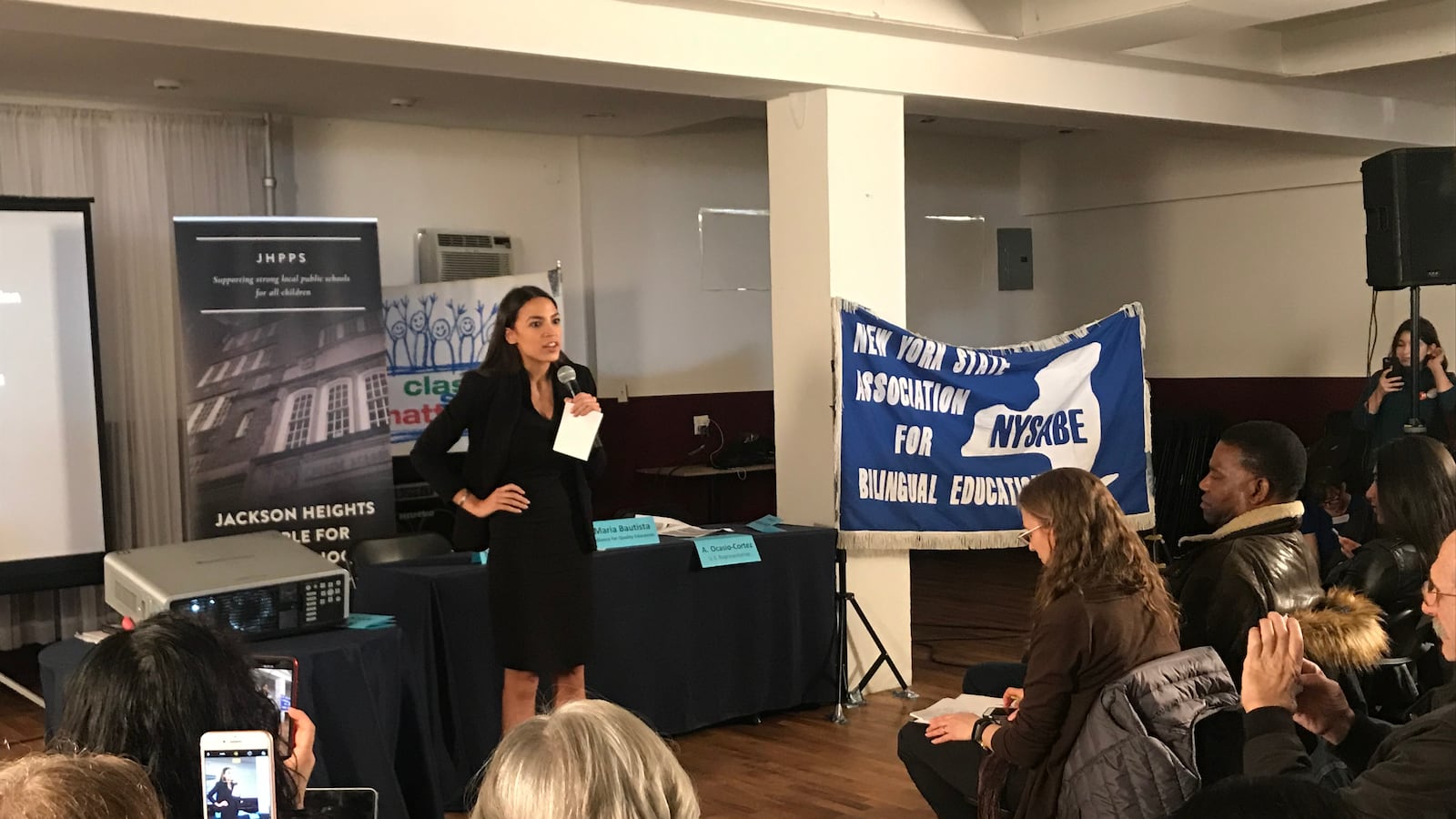The debate surrounding New York City’s eight specialized high schools caused the most divisive moment of an education town hall in Jackson Heights on Saturday, where U.S. Rep. Alexandria Ocasio-Cortez, state senators, and education activists took questions about improving public schools.
Ocasio-Cortez didn’t say whether she supports a city-backed proposal to get rid of the admissions exam for those elite schools in an effort to make them more diverse, but she questioned why all city schools don’t have similarly stellar reputations.
“Why isn’t every public school in New York City a Brooklyn Tech-caliber school?” Ocasio-Cortez asked, receiving loud applause from the audience of at least 150 people. “Every one should be.”
The issue led to a brief outburst when the panelists shared their thoughts on the specialized high schools. Maria Bautista, campaigns director for education advocacy group Alliance for Quality Education, strongly advocated for diversifying the schools and said that “tests do not level the playing field.”
A few Asian activists stood up in the back of the room, holding signs that said “Asian Racism” and shouted, “We are part of the minority!” The issue is high-stakes one for many Asian-Americans, who receive the largest share of admissions into the elite schools and feel the test is race-blind.
Hosted by Queens activists and parent leaders, the event, rooted in a progressive vision for public schools, was billed as part rally and part panel. (You can catch up on other comments during the panel here.)
So it’s perhaps not a surprise that the controversy surrounding the Specialized High School Admission Test would take center stage. Last year, 52 percent of specialized high school offers went to Asian students and 27 percent of offers went to white students, even though they make up 16 and 15 percent of city students, respectively. In contrast, 10 percent of offers went to black and Hispanic students, who together make up about 67 percent of city students.
One part of the city’s plan would be to expand its Discovery program — subject of an ongoing lawsuit — which admits students from high-need families who scored just below the cutoff for the exam. The plan would also require phasing out the admissions exam and instead give offers to the top 7 percent of students at each middle school. State legislators must amend a law to get rid of the exam, and so far this session, proposals to do that are getting little attention, even from the mayor himself as he focuses on retaining mayoral control of schools.
State Sen. Jessica Ramos — who at one point asked the protestors not to interrupt her — supported the idea that these schools are starkly segregated, and said many immigrant parents don’t understand that the specialized high schools are an option for their children.
“I want everyone, especially the folks in the back, to understand that we have a sincere issue where people who look like me and black people are not being accepted into specialized high schools in an equitable way,” Ramos, a Hispanic Democrat from Queens, said.
After the event, Ramos said she doesn’t know if getting rid of the exam is the best plan but that “it shouldn’t be the only metric” that admission is based on.
Ocasio-Cortez said her father was an “exception to these statistics,” and got into Brooklyn Tech in the 1970s. Even though he spent four years leaving home at 5 a.m. and taking the 6 train to school every day, he loved Brooklyn Tech, she said.
“My concern is that this right here, when we’re fighting each other, is exactly what happens in a scarcity mindset,” Ocasio-Cortez said, again earning applause and cheers.
The panelists, which included education researcher and historian Diane Ravitch and representatives from advocacy groups, also answered questions about high-stakes testing, their education heroes, and expanding bilingual education.
Ocasio-Cortez encouraged parents to continue organizing around issues they care about, such as removing testing from the federal Every Student Succeeds Act.
Correction: A previous version of this article incorrectly described how many white and Asian students received offers to specialized high schools.

